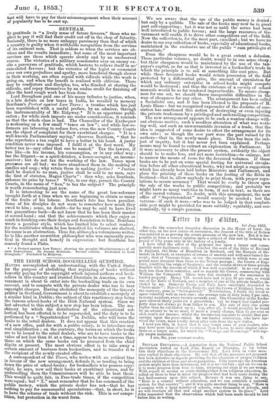rtfttr In qt Mgr.
1st June 1853.
Sin—In the somewhat irregular discussion in the House of Lords the other day, on the new duties on succession, the descent of the title of Nelson was referred to as proving the severe pressure of the new law. But it is im- possible to form a correct opinion upon a subject of this sort by looking to a period of fifty years only in the history of a family. I have triea the effect of the proposed law upon a larger and conse- quently more legitimate scale. I selected the seats of the Duke of Rutland in England, the Duke of Hamilton in Scotland, and the Marquis of Or- monde in Ireland, as examples of estates of ancient and well-ascertained de- scent ; that of Viscount Gage, as one the successions to which were at one period more frequent than those to the Nelson peerage ; the Crown of Eng- land, (omitting the reign of Stephen); and the estates of two or three private families with the descent of which I was well acquainted : in no case going back less than three centuries, and as regards the Crown, commencing with William the Conqueror. These were fair examples of the succession to landed property. Henry VII. would have had to pay 10 per cent, so would one of the Earls of Rutland, and a member of one of the private families in- cluded by me. Ormonde Castle and Firle have uniformly descended to " heirs-male" ; Belvoir Castle, Cadyow, and the Crown of England, have, on the contrary, gone to "heirs-general." Nevertheless, I found the totals to agree tolerably well in each case ; the average rate of duty being 2 per cant, in round numbers, every twenty-seventh year. The Chancellor of the Exche- quer allowed thirty years for a generation ; but he forgot that landed pro- perty does not always go from father to son. The rate of duty also seems higher than he calculated upon ; but, after all, it would probably be found by an actuary to be no more, if made a yearly charge, than 11 per cent on each year's net income, whilst the Income-tax amounts to double that per- centage upon the gross rental. So our landed aristocracy, who have sur- vived the latter, need hardly dread utter ruin from the new duties.
I send you this, in hopes that it may tempt some of your readers, who may have more time at their corimand than I have, to make similar calcu- floes on a larger scale, for which the "Peerage and Baronetag,e" will sup- ply ample materials.


























 Previous page
Previous page